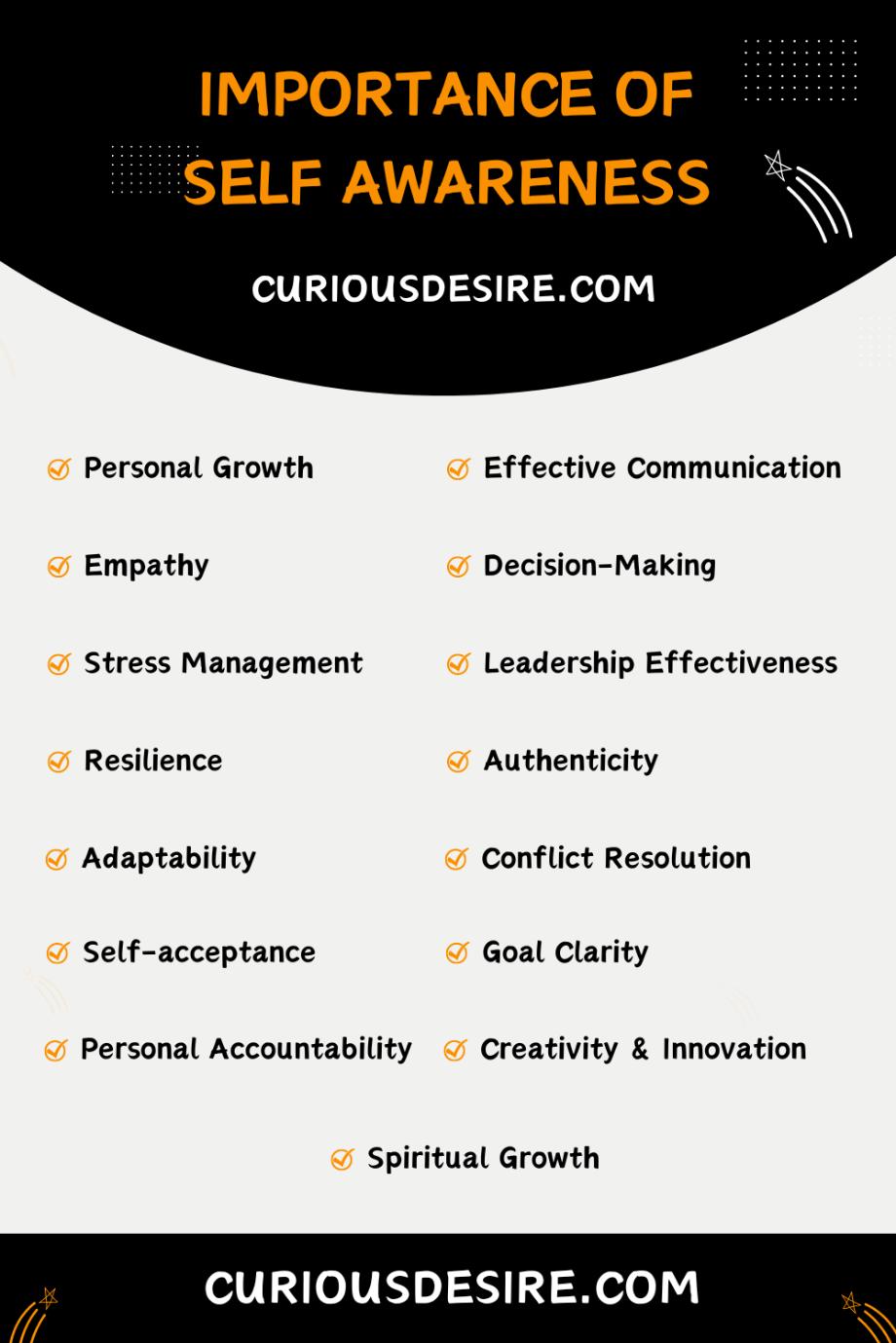Self-awareness is an essential aspect of personal development, emotional intelligence, and overall well-being.
It involves understanding one’s thoughts, feelings, behaviors, strengths, weaknesses, and motivations.
Bearing these facts in mind, let’s elaborate on some amazing benefits that underscore the undeniable importance of self-awareness.
[toc]

1. Personal Growth
Self-awareness is like holding up a mirror to ourselves. It allows us to see not just our surface, but also the deeper layers of who we are.
When we recognize our strengths, we can leverage them to achieve our goals and fulfill our potential.
Likewise, acknowledging our weaknesses doesn’t diminish us; instead, it opens the door to improvement.
2. Effective Communication
Communication is the heartbeat of our relationships, both personal and professional.
When we’re self-aware, we become attuned to how our emotions, thoughts, and behaviors influence how we interact with others.
This awareness empowers us to express ourselves clearly and authentically, building genuine connections.
Moreover, by understanding our communication patterns, we can become better listeners, truly hearing what others are saying without letting our own biases cloud our understanding.
3. Empathy and Understanding
Empathy is the bridge that connects us to others, allowing us to step into their shoes and see the world through their eyes.
Self-awareness acts as the foundation for empathy by deepening our understanding of our own emotions.
When we recognize and name our feelings, we become more adept at recognizing them in others.
This heightened empathy forms the basis for stronger interpersonal relationships, built on mutual respect and understanding.
4. Decision-Making
Life is a series of choices, each one shaping our journey in unique ways. Self-awareness guides us in making decisions that align with our values, goals, and motivations.
By understanding what truly matters to us, we can sift through the noise and focus on what’s essential.
This clarity enables us to weigh the pros and cons of different options with greater precision, ultimately leading to decisions that resonate with our authentic selves.
Moreover, self-awareness helps us anticipate the potential consequences of our choices.
5. Stress Management
In today’s fast-paced world, stress has become an inevitable part of life. However, self-awareness equips us with the tools to manage stress more effectively.
By understanding our triggers and recognizing the early signs of stress, we can intervene before it spirals out of control.
Self-awareness also helps us identify healthy coping mechanisms that calm our stressed minds and restore our emotional energy.
Whether it’s through mindfulness practices, physical exercise, or seeking support from loved ones, self-awareness empowers us to take proactive steps toward managing stress and maintaining our well-being.
6. Leadership Effectiveness
Leadership is not just about holding a position of authority; it’s about inspiring others to reach their full potential.
Self-awareness lies at the heart of effective leadership, enabling us to lead with authenticity and empathy.
When leaders understand how their actions and decisions impact those around them, they can develop a culture of trust and collaboration within their teams.
Moreover, self-aware leaders are open to feedback and willing to course-correct when necessary, demonstrating humility and integrity in their leadership approach.
7. Resilience
Life is unpredictable, and setbacks are inevitable. However, self-awareness strengthens our resilience in the face of adversity.
Self-aware individuals are adept at identifying their strengths and overcoming obstacles.
Moreover, they’re not afraid to seek support from others when needed, recognizing that resilience is not a solitary journey.
8. Authenticity
Authenticity is the cornerstone of a fulfilling life. When we’re true to ourselves, we align our actions with our values, beliefs, and aspirations.
Self-awareness enables us to peel back the layers of societal expectations and embrace our true selves with acceptance and compassion.
By honoring our authenticity, we get a sense of fulfillment and satisfaction that comes from living a life aligned with our deepest truths.
9. Adaptability
Change is the only constant in life, and adaptability is the key to thriving in uncertain times.
Self-aware individuals are more adaptable because they understand their own strengths, weaknesses, and limitations.
This awareness allows them to approach new situations with openness and curiosity, rather than fear and resistance.
Moreover, self-awareness helps individuals learn from their experiences and adapt their behaviors and strategies as needed.
Instead of clinging to the familiar, they embrace the unknown with confidence, knowing that growth lies on the other side of their comfort zone.
10. Conflict Resolution
Self-awareness plays a crucial role in conflict resolution by helping us recognize our own role in conflicts and understand our own biases and triggers.
Armed with this knowledge, we can approach conflicts with humility, empathy, and a willingness to find mutually beneficial solutions.
Instead of resorting to blame or defensiveness, self-aware individuals take ownership of their actions and actively listen to the perspectives of others.
11. Self-acceptance
In a world that often emphasizes perfection and conformity, self-acceptance is a radical act of self-love.
Self-awareness promotes self-acceptance by helping us embrace our flaws, imperfections, and vulnerabilities as integral parts of our identity.
Instead of striving for an unattainable ideal, we celebrate our uniqueness and individuality.
This acceptance cultivates a positive self-image and reduces feelings of shame and self-criticism.
12. Goal Clarity
Self-awareness is crucial for setting meaningful and achievable goals that resonate with one’s values, interests, and aspirations.
When individuals have a clear understanding of their strengths and weaknesses, they can align their goals with their capabilities, ensuring that they are realistic and attainable.
Also, self-awareness helps individuals develop actionable plans to pursue their goals effectively.
By recognizing their own limitations and areas for improvement, individuals can strategize and allocate resources wisely to maximize their chances of success.
This clarity and focus empower individuals to stay motivated and committed to their goals, even in the face of obstacles or setbacks.
13. Personal Accountability
Self-aware individuals take ownership of their actions, choices, and outcomes, recognizing that they are the primary drivers of their own lives.
Instead of blaming external factors or circumstances for their failures, they acknowledge their role in contributing to both their successes and setbacks.
Rather than dwelling on past failures or setbacks, self-aware individuals use them as opportunities for growth and self-improvement, fueling their personal development journey.
14. Creativity and Innovation
When individuals understand their cognitive processes and biases, they can recognize and overcome mental blocks that may hinder their creative thinking.
Self-aware individuals can generate novel solutions to problems and explore unconventional approaches.
Moreover, self-awareness encourages individuals to accept failure as a natural part of the creative process, enabling them to take risks and experiment without fear of judgment.
This freedom to think creatively and innovate allows individuals to push the boundaries of what is possible, driving progress and innovation in various domains.
15. Spiritual Growth
Self-awareness serves as a pathway to spiritual growth and enlightenment by encouraging individuals to explore their inner selves, beliefs, and values.
When individuals start a journey of self-discovery, they deepen their understanding of their spiritual identity and purpose in life.
This introspective exploration enables individuals to connect with something greater than themselves, whether it’s the universe, humanity, or a higher power.
Moreover, self-awareness enhances a sense of interconnectedness and compassion, recognizing the inherent value and dignity of all living beings.
This spiritual awareness promotes inner peace, fulfillment, and a sense of belonging, guiding individuals toward a deeper sense of purpose and meaning in life.
Ultimately, self-awareness opens the door to profound spiritual insights and experiences, leading individuals on a transformative journey of self-realization and spiritual enlightenment.
Importance of Self-Awareness FAQs
1. How to improve self-awareness?
Improving self-awareness involves engaging in practices that facilitate introspection and self-reflection.
Some strategies to enhance self-awareness include mindfulness meditation, journaling about thoughts and emotions, seeking feedback from others, practicing self-observation in various situations, and exploring one’s values, beliefs, and motivations.
Additionally, engaging in therapy or counseling can provide valuable insights into oneself and promote self-awareness.
2. What are self-awareness skills?
Self-awareness skills refer to the ability to recognize and understand one’s own thoughts, emotions, behaviors, strengths, weaknesses, values, and motivations.
These skills enable individuals to have a clear perception of themselves and their impact on others, fostering personal growth, effective communication, empathy, and decision-making.
3. What are the steps we can use for self-awareness?
The steps for enhancing self-awareness include:
- Engage in introspection and self-reflection.
- Practice mindfulness and present-moment awareness.
- Seek feedback from others and be open to constructive criticism.
- Journal about thoughts, emotions, and experiences.
- Explore values, beliefs, and motivations.
- Observe oneself in different situations and contexts.
- Engage in therapy or counseling for deeper self-exploration and insight.
4. What is the first step in self-awareness?
The first step in self-awareness is typically engaging in introspection and self-reflection.
This involves taking the time to examine one’s thoughts, emotions, behaviors, and experiences with curiosity and openness.
By becoming more aware of oneself, individuals can lay the foundation for deeper self-understanding and personal growth.
5. What are the five levels of self-awareness?
The five levels of self-awareness, as proposed by psychologists Shelley Duval and Robert Wicklund, are as follows:
- Level 0: No self-awareness.
- Level 1: Self-focused attention without self-awareness.
- Level 2: Self-awareness through self-recognition.
- Level 3: Private self-consciousness.
- Level 4: Public self-awareness.
These levels represent varying degrees of consciousness and awareness of oneself and one’s thoughts, feelings, and behaviors.
6. Is self-awareness the first step of success?
Yes, self-awareness is often considered the first step towards success.
Understanding oneself, including strengths, weaknesses, values, and motivations, is essential for setting meaningful goals, making informed decisions, and effectively navigating challenges.
Self-aware individuals are better equipped to leverage their strengths, address their weaknesses, and pursue paths that align with their values and aspirations, ultimately increasing their chances of success.
7. How many levels of self-awareness are there?
There are typically five levels of self-awareness, as proposed by Shelley Duval and Robert Wicklund.
These levels represent a continuum of consciousness and awareness of oneself, ranging from no self-awareness to high levels of self-awareness characterized by self-recognition, self-consciousness, and self-reflection.
8. What causes a lack of self-awareness?
A lack of self-awareness can be caused by various factors, including:
- Limited introspection and self-reflection practices.
- Avoidance of uncomfortable emotions or experiences.
- Lack of feedback from others.
- Cultural or societal norms that discourage self-exploration.
- Psychological defenses such as denial or repression.
- Trauma or adverse childhood experiences.
- Chronic stress or overwhelming life circumstances.
9. How can I improve my self-awareness and self-insight?
To improve self-awareness and self-insight, you can:
- Engage in regular introspection and self-reflection.
- Practice mindfulness meditation to cultivate present-moment awareness.
- Seek feedback from trusted friends, family members, or mentors.
- Journal about your thoughts, emotions, and experiences.
- Explore your values, beliefs, and motivations.
- Consider engaging in therapy or counseling for deeper self-exploration and insight.
10. How can I improve my low external self-awareness?
To improve low external self-awareness, you can:
- Practice active listening in conversations and pay attention to nonverbal cues.
- Seek feedback from others about your behavior and communication style.
- Reflect on how your actions and words may impact others.
- Engage in empathy-building exercises to better understand the perspectives of others.
- Take responsibility for your actions and strive to improve your interactions with others based on feedback received.
11. How do I overcome too much self-awareness?
If you feel overwhelmed by excessive self-awareness, you can:
- Practice self-compassion and accept yourself as you are, including your flaws and imperfections.
- Balance self-awareness with self-acceptance, recognizing that nobody is perfect.
- Engage in activities that distract you from excessive rumination or self-criticism, such as hobbies or spending time with loved ones.
- Set boundaries around self-reflection and give yourself permission to take breaks when needed.
- Consider seeking support from a therapist or counselor if excessive self-awareness negatively impacts your mental well-being.

